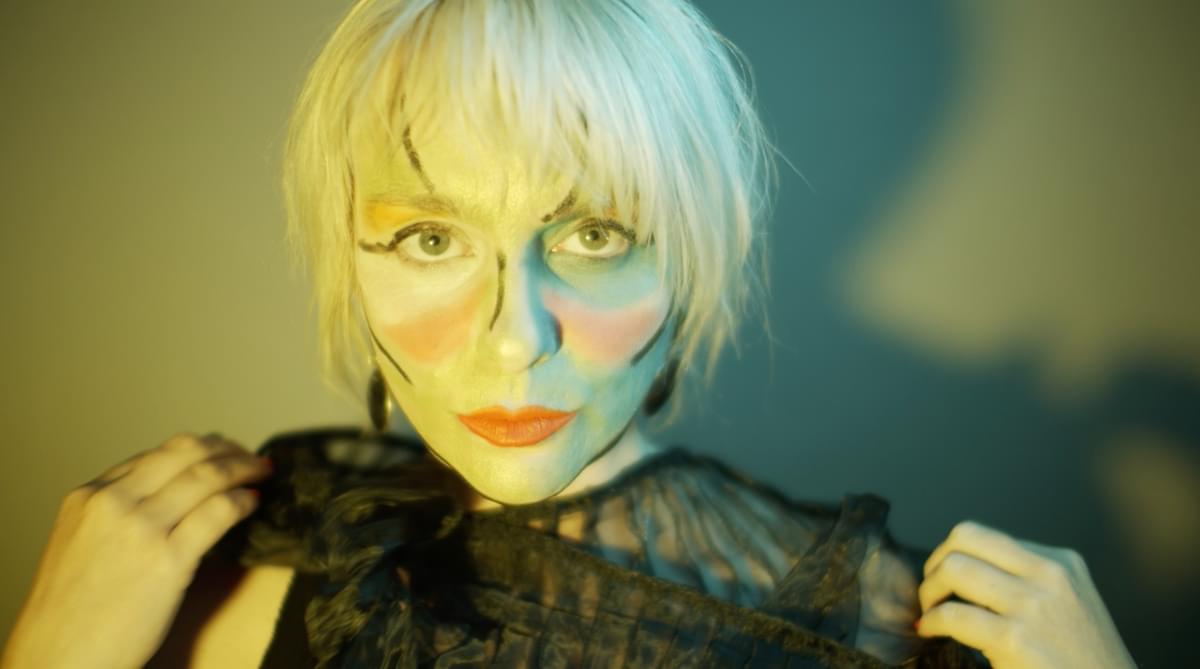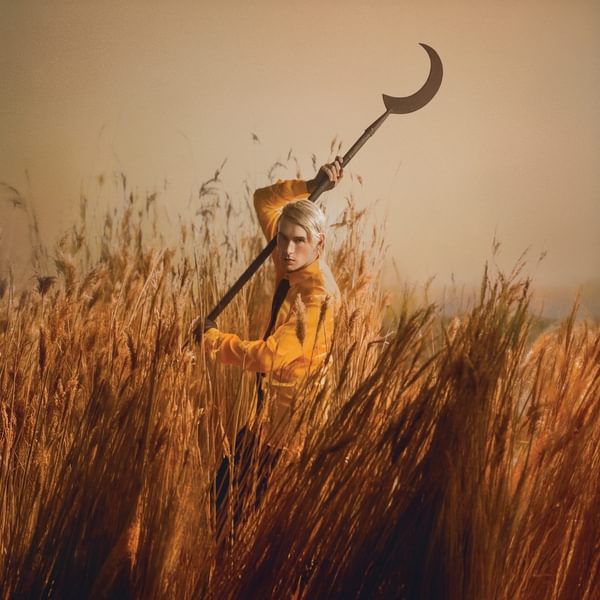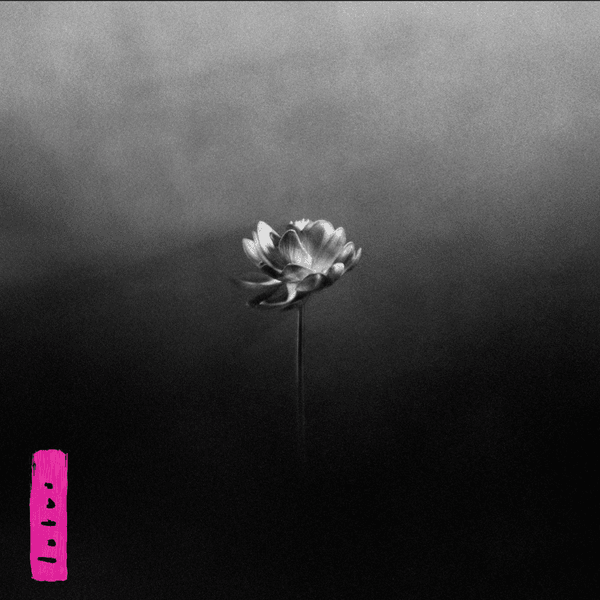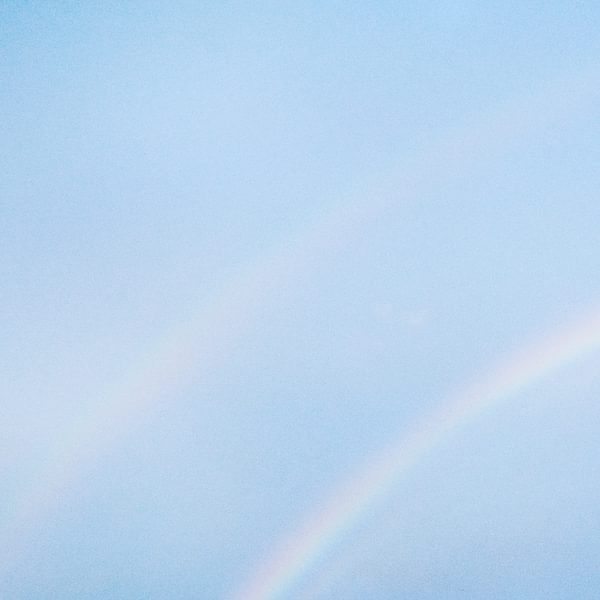
Hope among the havoc
With the seventh Mega Bog album End of Everything, Erin Birgy is embracing a new outlook with energised awe. She talks to Alan Pedder about demons, dependencies and the healing power of pop.
Erin Birgy just wants to enjoy her coffee, a smoke and some backyard birdsong, but the clatter of construction work and quotidian drone of people mowing their lawns is making it hard.
“Just annoying human shit,” she huffs lightly, taking her laptop – and me along with it – on a walk around the plot where she lives, spilling her drink as she goes. There’s no respite from the noise though, and she eventually gives up and goes inside. A desk in the living room will have to do today, it seems.
Birgy, who records as the sonically slippery, avant-pop entity Mega Bog, has an immediately likeable presence. With her lively ocean-coloured eyes, dimpled smile and distinctive, giddy laugh, she projects a sense of warmth and spontaneity that even a jittery internet connection can’t stifle. We’re here to talk about her new album End of Everything and its companion book of poetry The Practice of Hell Ending – both released through Brooklyn-based label Mexican Summer – and evidently there’s a lot to unpack. Those titles aren’t messing around.
“It just made sense to have a really dramatic title like End of Everything, because I felt that really was an option at one point,” says Birgy. “Maybe it was just a perspective I was choosing to explore. Like, what would happen if everything was just over, right now? I hadn’t felt like that since I was a teenager so it was interesting to circle back fully, to sort of complete a pattern, and then just let it go.”
Soaked in violence, blood and death, Birgy’s teenage years were mostly miserable. Her mother’s first husband was run out of Idaho state for trying to kill her, while her second husband, a wild horse racer, was the reason why Birgy spent much of her those years as part of a travelling rodeo. As well as the “massive abuse” she experienced at the hands of her family, who she says she’s now “semi-estranged” from, the frequent horrors of the rodeo life were hard to bear. “It was an insane way to grow up,” she says. “It’s funny, I’ve been seeing this person and every time I have a little anecdote about my childhood they’re like, ‘Wow, you’ve seen a lot of bloodshed,’ and I’m like, ‘Dude, I haven’t even begun!’”
At 15, she finally got out of the family ranch, moving to the nearby city of Spokane with her only friend (and former first love) Joel Gregory, where they both became regular contributors to alternative newspaper The Finger. Her earliest poems were published there, along with a weekly column that revolved around tea and conversation with strangers and engrained in her a passion for community that lives on through the Mega Bog extended family – Birgy once counted over 80 members who’ve flitted in and out of the band, with regulars including Big Thief’s James Krivchenia and Hand Habits leader Meg Duffy.
Spokane was an important stepping stone but it’s in Olympia, five hours west, that the origins of Mega Bog lie. By the time she was 18, Birgy had embedded herself in a creative community based around countercultural spaces like the Olympia Free School and The Finger Complex, which doubled as both a venue and her home. It was in Olympia that she met musicians Shelby Turner and Zach Burba, who helped bring Mega Bog into being as a full-band evolution of earlier projects Little Swamp and Midi Marsh. Moving to Seattle to be with Burba, Birgy started her own label, Wizards of the Ghost, through which the first two Bog tapes were born.

Thirteen years later, End of Everything arrives as the seventh full-length entry in the Mega Bog universe, and in many ways the most direct. Sidelining the “showy, flashy bullshit” of her last few albums to work within new, self-imposed limitations, it’s as much about reclaiming a sense of fun as it is an exercise in shaking the band free of foregone conclusions. “I started thinking, ‘Am I just gonna do the same thing forever?’,” says Birgy, halfway rolling her eyes.
The breakthrough came when she got her hands on a Roland D-50, the classic ‘80s synth behind the pizzicato chords of Enya’s “Orinoco Flow” and the notorious ‘DigitalNativeDance’ factory preset used by everyone from Prince and Michael Jackson to Miles Davis and Tangerine Dream. While her attempts to spice up her relationship with the guitar using less complex chords and alternate tunings had “felt unnatural or just unpleasant,” writing on the unfamiliar D-50 kindled the simplicity she’d been looking for. “We were like, ‘Why don’t we just make pop songs that actually sound like pop songs?’,” she says. “Like, let’s just make it as bombastic as possible.”
Fans of showy, flashy bullshit – a term she uses with affection – don’t go entirely short-changed. “It’s still pretty confusing and esoteric at points,” Birgy says, laughing. “It’s just that the arrangements are simpler and the concepts are more universal this time. Like, here’s a song about being perceived. Here’s one about romantic challenges. And here’s one about realising that you’re part of the apocalypse and there’s so much hopelessness to cope with.”
About that hopelessness: the first song written (“Anthropocene”) was Birgy’s direct response to the catastrophic wildfires across California and the Amazon rainforest in late 2019 – “I see a burnt up alligator / what the fuck?” goes one attention-grabbing lyric – while the rest came at the end of pandemic year zero. After the best part of two decades of being in almost constant motion, Birgy found the early days of the shutdown hard going. With her usual distractions off the table, she was forced to really look at the way her life had unfolded and the traumas of her childhood began to crowd back in with unsparing detail. Add in a relationship breakdown and a massively destabilising incident where a stranger broke into her home and sexually assaulted her, it’s no wonder she hit such a frightening low. “I was trying to see the positives but I didn’t have the tools to even understand what positivity was, to be honest,” she says.
Immersing herself in songs that electrified something inside her, Birgy retreated into a space where she could “get [her] shit together, on a macro and micro level.” “I was really relying on outside energy because my own was pretty chaotic,” she says, explaining how she leaned on the music she’d loved in years gone by – songs like “Smalltown Boy” by Bronski Beat, “What Is Love?” by Haddaway and “almost anything by Thin Lizzy,” alongside more the more eccentric works of Kate Bush, Klaus Nomi and Italian experimentalist Franco Battiato, among others. Smashed together, these multifarious influences feed into a fraught half hour of mutated, bullish pop that’s torridly intense but with room for celebration.
Born into a long line of alcoholics, Birgy’s decision to get sober and start doing “a shit tonne of work” on herself was a major influence on the opposing forces that make End of Everything so absorbing. That’s where the poetry book title comes in, too – a conscious nod to the new ways in which she’s learned to process and accept her path in life. “I think I was pretty dependent on the fear and negativity of my own personal narrative,” she says, choosing her words carefully. “It was kind of a crutch at times. Like, if I felt nobody understood me, I could point to my fucked-up life and terrible childhood and say, ‘This is why.’”
Digging into cognitive behavioural therapy and mindfulness practices, she found that she could start to “re-route” certain thought processes and to relearn how to be good to herself and better to the people she loves. “I’ve learned to finally accept some things,” she says, smiling. “Now I can look back and be like, ‘Oh, yeah, that was a really dark time. But it doesn’t have to be dark forever.’”
Using small daily routines and practices that can be as simple as just taking time to notice her hands, Birgy has learned how to anchor herself in “a reality that’s manageable” as opposed to “all the crazy shit” of her untrained emotions. Daily writing helps too, and she says the poems in The Practice of Hell Ending are only lightly edited so as not to lose what she’d felt in the moment. “Of course, as soon as I feel something and write it down, it’s already dead and gone. But it’s kind of beautiful to document it and be able to look back and see the process.”
With the album, the book and three self-directed videos to work on, Birgy is aware that it might look like she was just replacing one crutch with another in the form of work. “For sure it’s a distraction, but it’s actually been really healing to just pile it all on,” she says. “This album is basically just how we processed everything, and how we sort of created an alternative dimensionality within the songs that’s not so emotionally dismal or bleak as when I wrote them. We’ve turned those songs into a bangin’ record and that feels good and exciting to me.”
Lead single “The Clown” may have started out life as “a slow, sappy, emotional, soft-spoken thing,” but you wouldn’t know it from Birgy’s increasingly unhinged vocal, wonderfully OTT sound effects, and an actually hilarious lyric about beheading young men. “All and Everything”, meanwhile, realises her earliest fantasy of Mega Bog as a metal band with its full-throated screamed conclusion. “Going back to the beginnings of the band, I felt kind of trapped in this Pacific Northwest twee culture and really wanted to break out of that,” she says. “I was really into black metal at the time but we had no idea how to play heavy, so it was really kind of pitiful, but maybe cute, when we tried.”
"So often we use the narratives that we create for ourselves as protection – even if it’s a hellscape we create, as in my case!"
“It’s been hard, up until recently, to feel like I had permission – even from myself – to scream like that, or even to sing the way I do across this record. It’s pretty bold. It’s what I’ve always sort of felt was at the root of me but I’ve never had the courage to share before. To me, the scream feels like cutting my own head off, basically. What will come out afterwards? Will anything come out? It doesn’t even matter, it just needs to be done.”
While Birgy says she can still sometimes get sort of embarrassed by how vulnerable and sentimental she can get in her poetry practice, she’s fully okay with the nude painting of herself that covers the record. Painted by Joel Gregory, it’s an image that dates back to the days before Mega Bog when Birgy was “doing a lot of crazy work” including a regular gig making porn films.
“That image is kind of woven through Bog history and I’ve always wanted to use it for something,” she says. “After the assault, I felt it was important to put it out there to sort of reclaim my body autonomy. It’s almost like I’m saying, ‘Well, what are you going to do with this vulnerable, naked body? Are you going to harm this image in your own mind, or are you going to cherish it as something human and protect it?’ I wanted to sort of bring up the question of control, silently, as a way for people to reflect on their own ethos.” She grins. “It’s also fucking beautiful.”
Working closely with Gregory on the artwork, Birgy chose other “virile imagery” like the volcano that covers the back of the record and studies of melted wax from the candles she uses in her daily meditations. In the background, a painting of a calla lily reflected in water is suggestive of a demonic presence – though, she insists, not a maleficent one. “The demon is not there to attack. It’s there to help, in a way. To endure and to find confidence in one’s security and place.” But why a water demon, specifically? She laughs. “Well, I spend much of my day in the bath. I’m in water all the time.”
But seriously, Birgy’s immersion in the occult has been a central part of her healing over the past two years. “Part of reckoning with my childhood narrative has been getting really into horror and demonology,” she says. “I’ve been kind of hunting for things that I thought were crucial figures in my own story, lurking in the background, but almost protecting me in a way. So often we use the narratives that we create for ourselves as protection – even if it’s a hellscape we create, as in my case!”

These days, Birgy seems to be in a flourishing place. She’s studying the history, culture and language of Greece – crumbs of which creep into her poems – and has even considered moving there after her first visit triggered something in her that made her feel wild again, but this time in a healthy way. She’s learned to recognise, and even be in awe of, the kind of dependency that is actually good for us – relationships in which we can feel rooted and cared for. She tells me how a conversation with Zach Burba recently reminded her of how, when they first met in Olympia, she could only talk about her childhood in terms of “supernatural ghost stories” and never went into detail. “It’s clear to me now that I didn’t even know how to feel safe around friends. There was a lot of fight-or-flight thinking in the past.”
While self-discovery is a noble journey that we’re all on, in some way, all of the time, it’s the equally noble journey of co-discovery – or co-regulation – that Birgy is more savvy to now. “It’s this idea of getting to know yourself much better through being able to explore these healthy friendships,” she says. “In the relationships that last, it’s a process of helping each other to be more ourselves. You learn more about your capacity and how you can calm each other down in a way that makes you feel more free.”
It's no coincidence, then, that the final poem in The Practice of Hell Ending (“LXV”) reads like a set of affirmations. Having severed the chokehold of anxiety and threat, Birgy’s pen comes to rest in her garden. A space for loving, providing and dancing. Lawnmowers not included.
Get the Best Fit take on the week in music direct to your inbox every Friday

Patrick Wolf
Crying The Neck







